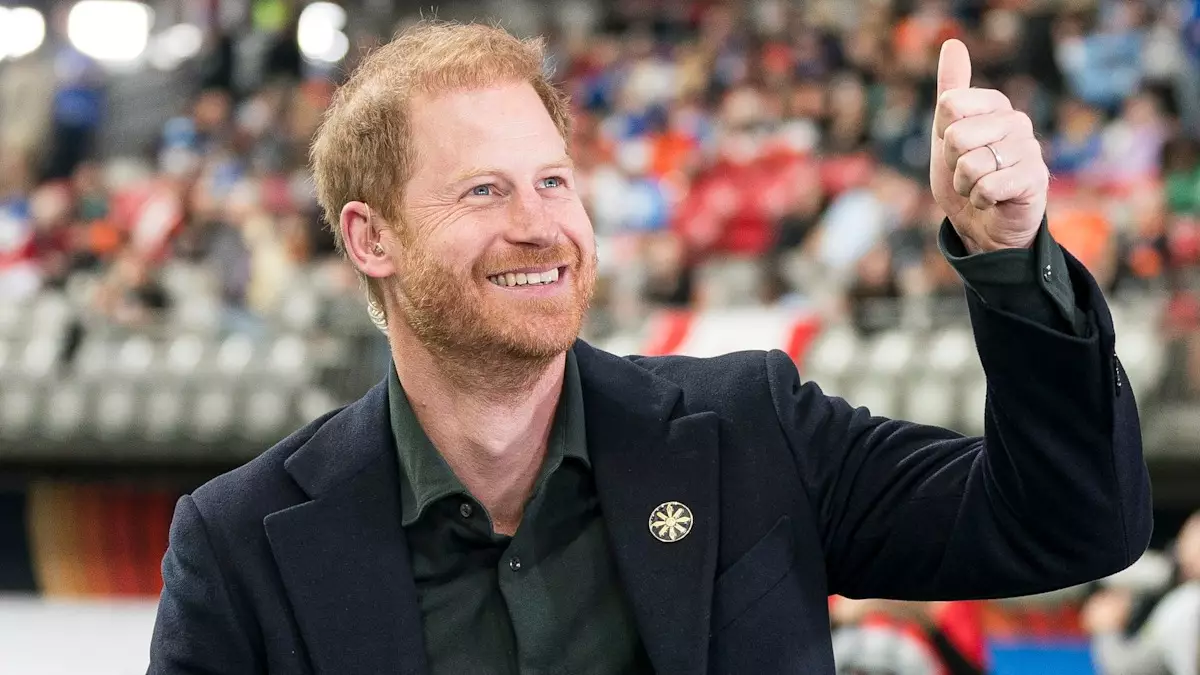In 2020, Prince Harry and Meghan Markle made headlines as they stepped back from royal duties and relocated from London to the idyllic surroundings of Montecito, California. A move that followed a tumultuous period within the British royal family, this transition has not only altered their lifestyles but also significantly influenced Harry’s speech patterns. Now, over four years later, the Duke of Sussex seems to reflect a fusion of British tradition and American cultural influence, a blend that has sparked considerable discussion among fans and observers alike.
The recent attention arose from a lighthearted video featuring Harry at East Side Ink, a tattoo parlor in New York, promoting The Invictus Games. In this two-minute skit, Harry, engaging in conversation with musician Jelly Roll, showcased a more casual demeanor. However, what caught the public’s eye was not merely his humor or relaxed posture, but rather his evolving accent—a noteworthy departure from the crisp, Etonian enunciation associated with his British heritage.
Harry’s speech exhibited an unmistakable infusion of American vernacular. Phrases such as “Screw it, let’s do it,” coupled with his casual references to the tattoo artist as “dude,” reveal a shift towards a more relaxed linguistic style. Notably, he even adopted American pronunciations, opting for “a**” instead of the British “a***,” underscoring his integration into American culture. Communication coach Anthony Shuster pointed out that the contrast between Harry’s current speech and that of his father, King Charles, is stark—a reflection of how geographical and cultural shifts can redefine one’s articulation and manner of communication.
It seems that the roots of this accent changes can be traced back several years. As Shuster noted, there was a perceptible shift in Harry’s speech after he met Meghan in 2016. During a public appearance in 2019, when Harry introduced his son, Archie, he showcased a linguistically softer side, pronouncing “little” with a “D” sound, rendering it as “liddle.” This phonetic alteration embodies what many linguists recognize as common in American English and indicates a gradual yet persistent shift.
Meghan Markle, a native of Los Angeles, has undoubtedly had a major influence on Harry’s linguistic evolution. Linguistic studies indicate that close interpersonal interactions can cause individuals to unconsciously adopt the speech patterns and accents of those around them. As Harry and Meghan continue to navigate life in California, surrounded by American culture, it is plausible that Harry is not only adjusting to his wife’s way of speaking, but he is also immersing himself in local vernacular and expressions.
Further emphasizing this transition, Harry mentioned in a recent interview with Good Morning America that he “loves every single day” spent in California, showcasing his deepening connection to American life. With their children, Archie and Lilibet, being raised in a bilingual environment, it is evident that both Harry and Meghan are keen on fostering a blended cultural identity, integrating British roots and American influences.
This evolution of accent raises intriguing questions about identity and belonging. For some observers, Harry’s adaptation to American slang and accent highlights a natural progression of integrating into a new society. Others speculate that this change may reflect a desire to resonate with a predominantly American audience and create a more relatable public persona. During previous podcast recordings, Harry employed American phrases like “awesome” and “you guys,” a nuanced attempt to connect with listeners.
Yet, this accent shift has not gone unnoticed back home in the UK. Observers reflect on the contrast between Harry’s current speech and his earlier, more strictly British enunciation from his youth. Shuster revisited footage from Harry’s gap year, where his articulation was markedly different—clear and distinctly British. These observations evoke a sense of nostalgia, juxtaposing Harry’s royal past with his current status as a California resident.
Prince Harry’s evolving accent serves as a fascinating lens through which to examine broader themes of identity, cultural assimilation, and adaptation. His journey from the rigid traditions of the British monarchy to a more relaxed Californian lifestyle encapsulates a personal metamorphosis, not just in accent but also in character. As he continues to navigate life as a duke in a foreign cultural landscape, Harry’s linguistic transformation represents his ongoing pursuit of belonging and identity—a testament to how language can mirror our experiences and relationships in shifting environments.

